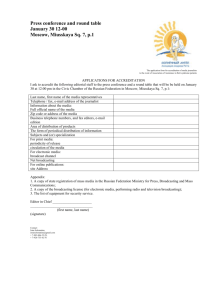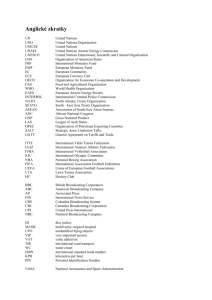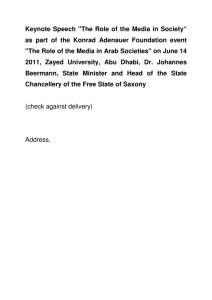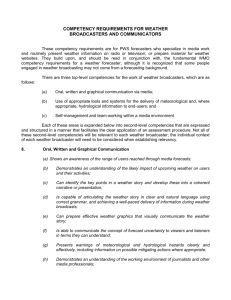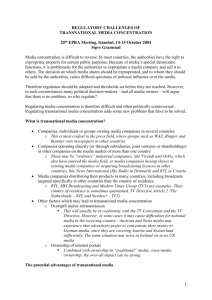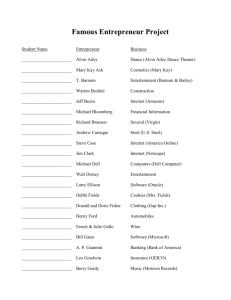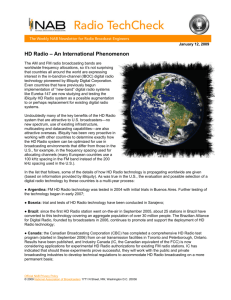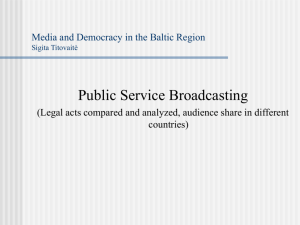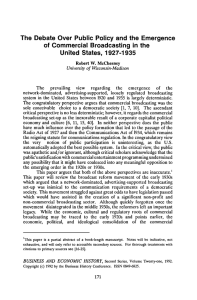International Encyclopaedia of Laws Media Law
advertisement
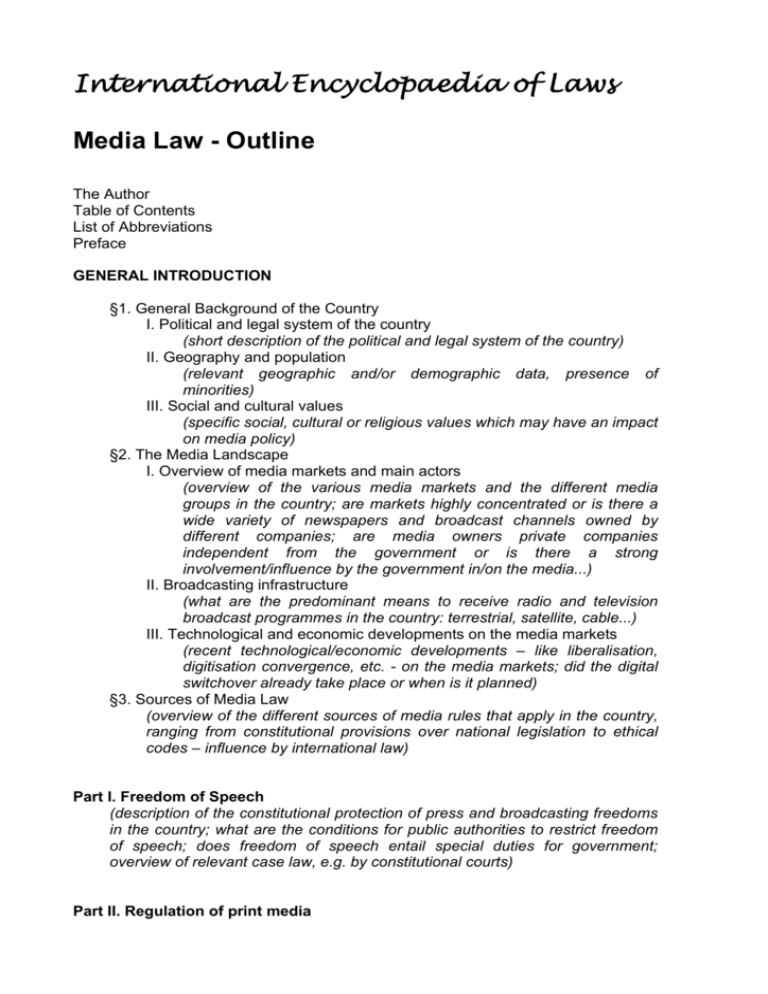
International Encyclopaedia of Laws Media Law - Outline The Author Table of Contents List of Abbreviations Preface GENERAL INTRODUCTION §1. General Background of the Country I. Political and legal system of the country (short description of the political and legal system of the country) II. Geography and population (relevant geographic and/or demographic data, presence of minorities) III. Social and cultural values (specific social, cultural or religious values which may have an impact on media policy) §2. The Media Landscape I. Overview of media markets and main actors (overview of the various media markets and the different media groups in the country; are markets highly concentrated or is there a wide variety of newspapers and broadcast channels owned by different companies; are media owners private companies independent from the government or is there a strong involvement/influence by the government in/on the media...) II. Broadcasting infrastructure (what are the predominant means to receive radio and television broadcast programmes in the country: terrestrial, satellite, cable...) III. Technological and economic developments on the media markets (recent technological/economic developments – like liberalisation, digitisation convergence, etc. - on the media markets; did the digital switchover already take place or when is it planned) §3. Sources of Media Law (overview of the different sources of media rules that apply in the country, ranging from constitutional provisions over national legislation to ethical codes – influence by international law) Part I. Freedom of Speech (description of the constitutional protection of press and broadcasting freedoms in the country; what are the conditions for public authorities to restrict freedom of speech; does freedom of speech entail special duties for government; overview of relevant case law, e.g. by constitutional courts) Part II. Regulation of print media Chapter 1. The journalists' profession (Are there special rules that apply or conditions that you need to fulfil in order to work as a journalist? What is the legal position of bloggers? Are they considered as "full" journalists?) Chapter 2. Journalists' rights §1. Role of journalists as watch-dogs of society §2. Journalists' independence §3. Protection of journalistic sources Chapter 3. Journalists' liability §1. General information on the liability system §2. (Is there a special liability regime for journalists? Who will be held liable: only the journalist or also the publisher...?) §3. Defamation and libel §4. Privacy Chapter 4. Right to reply Chapter 5. Access to public information §1. Public documents and meetings §2. Court hearings and documents Chapter 6. Press Council Part III. Regulation of audiovisual media (broadcasting) Chapter 1. Public service broadcasting §1. The concept and mission of public service broadcasting (How is public service broadcasting conceived? What does its mission entail?) §2. The organization of public service broadcasting (How is PSB organised and structured in your country? Is it a body independent from government? How are directors and board members appointed? Can they be dismissed by government or only by parliament? What kind of advisory bodies are created in the context of PSB to involve various groups in society?) §3. The financing of public service broadcasting (How is PSB financed in your country: licence fees, tax money, dual funding? Can the PSB generate advertising and merchandising revenues without any limit?) Chapter 2. Private broadcasting §1. Different categories of private broadcasters (What are the different categories of radio, television, internet broadcasters that can operate in the country? Is there scope for national, regional, local broadcasters, for community radio...? How are these various categories defined and what conditions should they fulfil to qualify as a certain type of broadcaster? Or is there only one broad category of radio / TV broadcasters? Does internet TV / radio fall into the same category as traditional broadcasting? Is there a distinction between linear and non-linear services, and are on-demand video services regulated?) §2. Licensing requirements (What are the conditions to operate on the market: do you need a licence, or do you only have to notify your activities to the regulator...? How are licences renewed/withdrawn?) Chapter 3. Programme standards §1. Impartiality §2. Cultural diversity (Requirements regarding cultural diversity in the programmes, linguistic requirements, the range and variety of programmes...) §3. Protection of minors (indecency and violence) §4. Human dignity §5. Right of reply Chapter 4. Political broadcasting §1. Rules on political independence of broadcasters §2. Fair representation in election periods §3. News and current affairs programmes §4. Political advertising Chapter 5. Advertising rules §1. Various forms of commercial communications (Overview of definitions of advertising, sponsorship, product placement, teleshopping, etc.) §2. Restrictions on content (Qualitative rules for commercial communications, e.g. prohibition of incitement to hatred or harmful content to minors, prohibition of advertising offense to religious beliefs, prohibition of tobacco advertising, special rules for advertising for alcohol...) §3. Time and frequency restrictions (Quantitative rules for commercial communications, e.g. daily or hourly limit to advertising, special rules for insertion of advertising in programmes, maximum number of interruptions, special categories of programmes which cannot be interrupted for advertising, etc....) §4. Sponsorship §5. Product placement Chapter 6. Right to information §1. Access to major events §2. Short news reporting Chapter 7. Access to networks §1. Must carry rules §2. Other access obligations for networks (For instance in EU Member States, this will cover the significant market regime from the electronic communications directives) Chapter 8. Standards and interoperability Part IV. Cross ownership regulation Part V. Supervision: media regulator Chapter 1. Organisation Chapter 2. Tasks Chapter 3. Sanctioning powers Selected Bibliography Index INTERNATIONAL MONOGRAPH I. International Conventions Chapter 1. Universal Declaration of Human Rights (1948), Article 19 Chapter 2. International Covenant on Civil and Political Rights (1966), Article 19 II. Council of Europe Chapter 1. The European Convention for the Protection of Human Rights and Fundamental Freedoms (Art. 10) Chapter 2. European Convention on Transfrontier Television Chapter 3. Committee of Ministers' Declarations, Recommendations and Resolutions Chapter 4. Parliamentary Assembly Recommendations and Resolutions III. European Union Chapter 1. Charter of fundamental rights of the European Union Chapter 2. Media and economic freedoms in the EC Treaty Chapter 3. Media and the competition rules Chapter 4. Secondary legislation §1. Audiovisual Media Services Directive §2. Other


